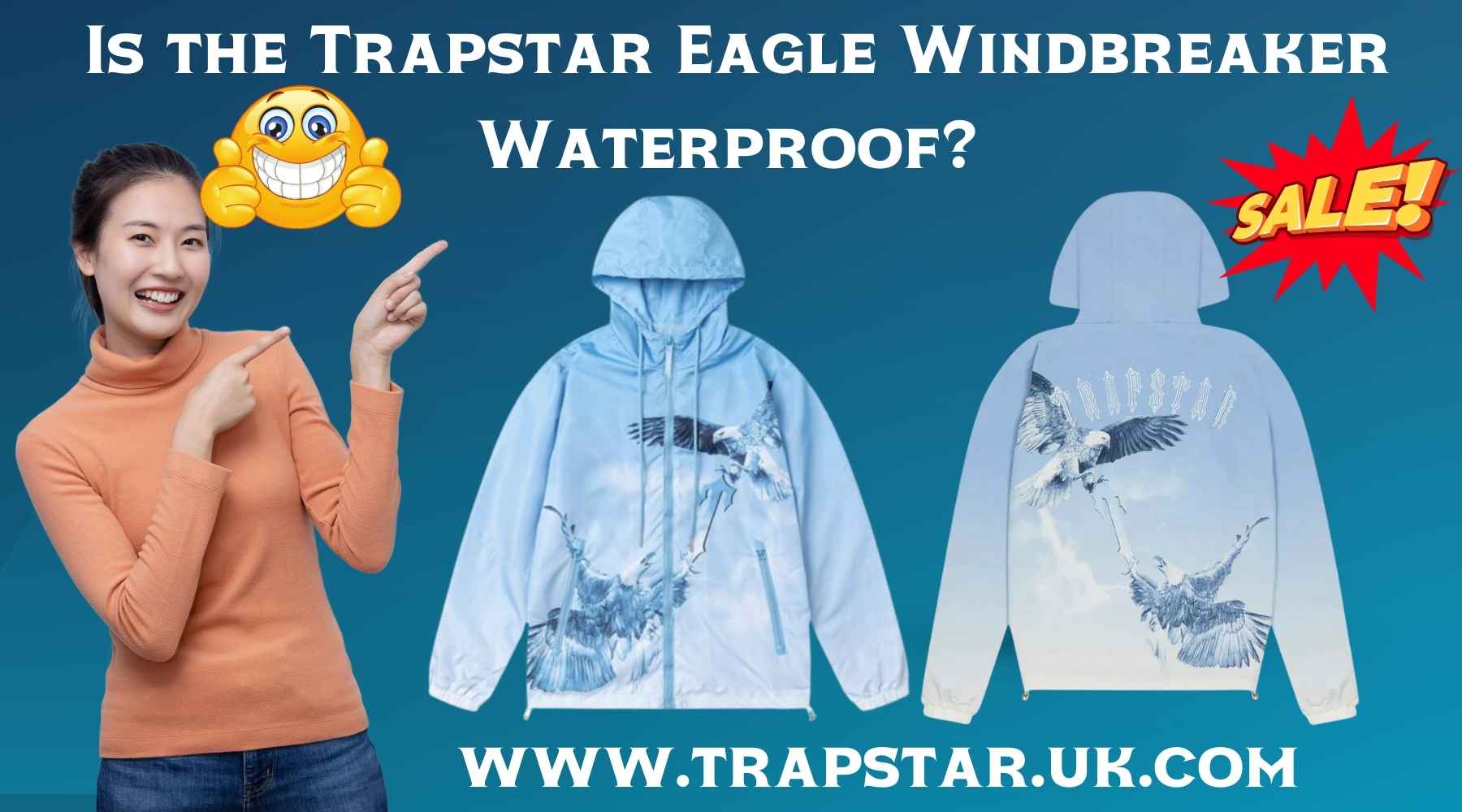When you’re drawn to stylish streetwear with practical features, the Trapstar Eagle Windbreaker might easily catch your eye. Known for its bold branding and sleek design, this jacket has gained immense popularity among city dwellers and outdoor enthusiasts alike. However, one crucial question lingers for those venturing beyond style is the Trapstar Eagle Windbreaker waterproof?
This guide dives deep into the water-resistant qualities of the Trapstar Eagle Windbreaker, examining its materials, features, and real performance to help you decide if it’s the right jacket for your rainy-day adventures.
Materials and Fabric Technology
Fabric Composition
The Trapstar Eagle Windbreaker is crafted primarily from lightweight, high-quality polyester—a fabric commonly used for its durability and weather resistance. Polyester offers some level of water resistance, enabling it to repel light moisture, but it’s not inherently waterproof.
Waterproof vs. Water-Resistant
Before we get ahead of ourselves, it’s crucial to distinguish between waterproof and water-resistant jackets.
- Waterproof jackets completely block water because they are made with impervious materials and sealed seams.
- Water-resistant jackets, like the Trapstar Eagle Windbreaker, are designed to handle light rain or splashes but won’t withstand heavy downpours.
With this context in mind, let’s look at the specific waterproofing features of this jacket.
Waterproofing Features
Coating or Treatment
The Trapstar Eagle Windbreaker is treated with Durable Water Repellent (DWR) coating. This treatment creates a protective outer layer that causes water to bead and roll off the jacket rather than soak into the fabric. While effective against light rain, DWR coatings are not a match for prolonged exposure or heavy rainstorms.
Seams and Zippers
Waterproof jackets often feature sealed seams and water-resistant zippers to prevent moisture from entering the garment. Unfortunately, the Trapstar Eagle Windbreaker lacks fully sealed seams, leaving it more vulnerable to water penetration during intense weather conditions.
Performance in Light to Moderate Rain
Handles Light Rain with Ease
When it comes to sudden light rain showers or drizzles, the Trapstar Eagle Windbreaker holds its ground. The DWR coating effectively repels droplets, ensuring you stay dry for brief periods. This makes it a suitable choice for city strolls or light outdoor activities in damp weather.
Quick-Drying Material
One standout feature is how quickly the jacket dries if it does become wet. Thanks to the polyester construction, a quick hang in a breezy space will restore your jacket to its original state in no time.
Limitations in Heavy Rain
Not Fully Waterproof
Taking on a heavy downpour? It’s best to grab a fully waterproof jacket instead. While the Trapstar Eagle Windbreaker looks great and works well for light rain, it’s not designed to withstand hours of torrential weather. Water can seep through the seams, leaving you damp if the rain persists.
User Feedback
Customer reviews largely highlight the jacket’s performance in urban environments where light rain is the norm. However, many note that the lack of sealed seams or multi-layer waterproof fabrics means it’s not suited for extended exposure to heavy rain or wilderness hikes.
Wind Protection vs. Waterproofing
Windproof Strengths
The Trapstar Eagle Windbreaker truly shines in its windproof capabilities. Designed to block chilly gusts, this lightweight jacket provides excellent comfort during breezy conditions—a go-to for windy days in and out of the city.
Overall Weather Protection
While its water resistance and windproofing make it versatile for mild weather, it’s not an all-weather jacket. If staying completely dry is your priority, pair it with an umbrella or invest in a rain-specific alternative.
Comparison to Other Jackets
How It Compares
When compared to other fashion-forward lightweight jackets, the Trapstar Eagle Windbreaker positions itself well for urban use. It performs similarly to popular brands like Adidas windbreakers, which prioritize style and breathability over full waterproofing. However, it falls short of specialized hiking jackets like The North Face’s line, which offer true waterproofing for outdoor adventures.
Why It’s Not Fully Waterproof
Windbreakers primarily focus on wind protection, breathability, and ease of movement—making them lightweight and comfortable. Fully waterproof jackets often sacrifice some breathability, which can lead to overheating. The Eagle Windbreaker, like many others in its class, favors comfort and style without compromising too much on light rain protection.
Pros of the Trapstar Eagle Windbreaker’s Waterproofing
- Handles Light Rain: Perfect for everyday wear and unexpected drizzles.
- Quick Drying: The polyester material ensures minimal downtime after getting wet.
- Breathable and Comfortable: Keeps you feeling dry from inside-out without overheating in mild weather.
Cons or Limitations
- Not for Heavy Rain: Not ideal for extended exposure to harsh downpours.
- Unsealed Seams: Vulnerable to leakage during prolonged rain.
- Limited Waterproofing: Primarily designed for style and wind protection rather than full weatherproofing.
When to Wear the Trapstar Eagle Windbreaker
The Trapstar Eagle Windbreaker is best suited for urban explorations, short commutes, or mild rainy days. Whether you’re heading out for a casual afternoon coffee run or planning a light outdoor trek, this jacket delivers functionality and fashion. However, if the weather forecast warns of heavy rain, be sure to swap it for a fully waterproof jacket.
Frequently Asked Questions
Is the Trapstar Eagle Windbreaker fully waterproof?
No, it is water-resistant, not fully waterproof. It can repel light moisture but won’t protect you during heavy rain.
Can I wear the Trapstar Eagle Windbreaker in heavy rain?
While it’s possible, the jacket may not perform well under prolonged exposure to heavy rain due to its unsealed seams and limitations in waterproofing.
How long can the Trapstar Eagle Windbreaker withstand light rain before getting wet?
The jacket performs well in light rain for short periods, typically around 20–30 minutes. Beyond that, water may start to soak through.




Pingback: What is the Trapstar Eagle Windbreaker and Why is it So Popular?